40 Famous First Lines of Books
They hook us from the very first words, instantly immersing us in new worlds and compelling narratives. Whether timeless classics or contemporary tales, the most memorable stories often begin with unforgettable opening lines that introduce dramatic characters, and vivid settings, stir emotions and bold declarations.
Though encompassing every genre from romance to mystery, these iconic first lines share the power to capture our imaginations and draw us irresistibly into the pages ahead. Some establish a mood and foreshadow coming twists, while others offer philosophical musings or pointed social commentary.
The diversity of voices and literary styles represents the breadth of human experience. But each serves as a small literary masterpiece, the famous author’s first brushstroke on a limitless canvas. The possibilities and promises contained within demonstrate writing at its most impactful and succinct.
These famous first lines from authors have intrigued generations of passionate readers, offering windows into remarkable lives both real and fictitious. So let us flip back to the starting pages of our most beloved books to revisit and celebrate these 40 famous first-line gateways into the literary lands we love to get lost in.
1. “In the beginning, God created the heaven and the earth.” – “Genesis”, The Bible
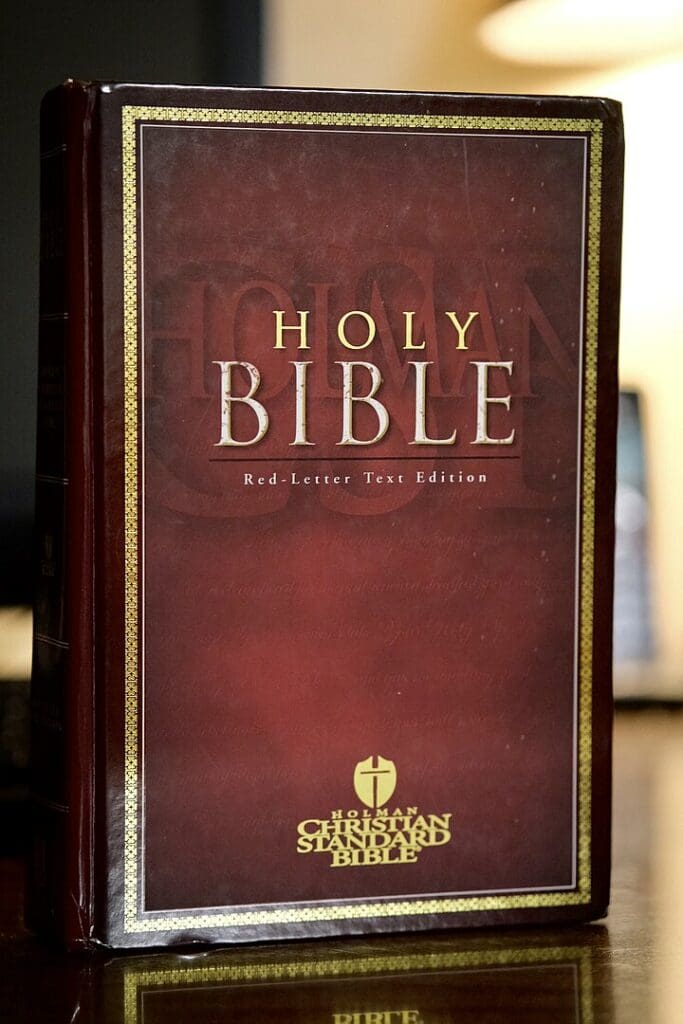
Xrayguy1969, CC BY-SA 4.0, via Wikimedia Commons
This famous first line introduces the creation narrative in the Book of Genesis. The opening of the first book of the Bible establishes God as the creator of the universe. The simplicity and grandeur of the line have made it one of the most well-known first lines in literature.
Though only ten words long in its original Hebrew, this verse lays the foundation for the entire Biblical story to follow. Its theological significance as describing God’s role as a creator has profoundly shaped Jewish and Christian understandings of the relationship between God and the world.
2. “It was the best of times, it was the worst of times.” – “A Tale of Two Cities” by Charles Dickens
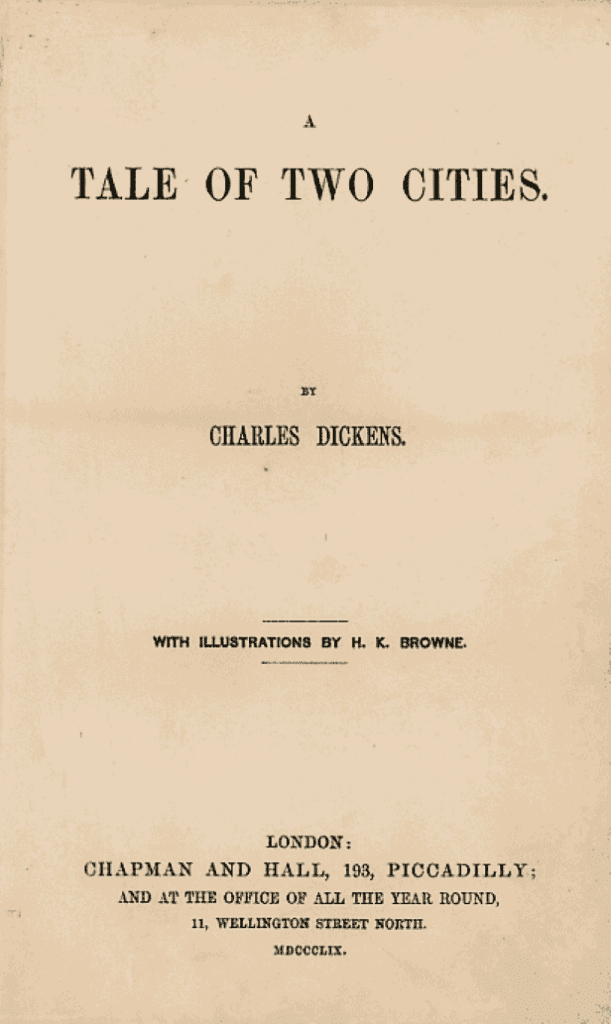
See page for author, Public domain, via Wikimedia Commons
The opening line of A Tale of Two Cities, “It was the best of times, it was the worst of times,” immediately draws in readers by creating a paradox. This line refers to the time period before the French Revolution when great hope and progress coexisted with extreme poverty and misery in England and France.
By setting up this central contradiction at the outset, Dickens hints at the themes he will explore throughout the novel, such as justice, sacrifice, and social unrest. The memorable contrast and rhythm of this oft-quoted line sets the tone for the sweeping social commentary Dickens provides in the story to follow. This is why it remains one of the most famous first lines in literature.
3. “It was a pleasure to burn.” – “Fahrenheit 451” by Ray Bradbury
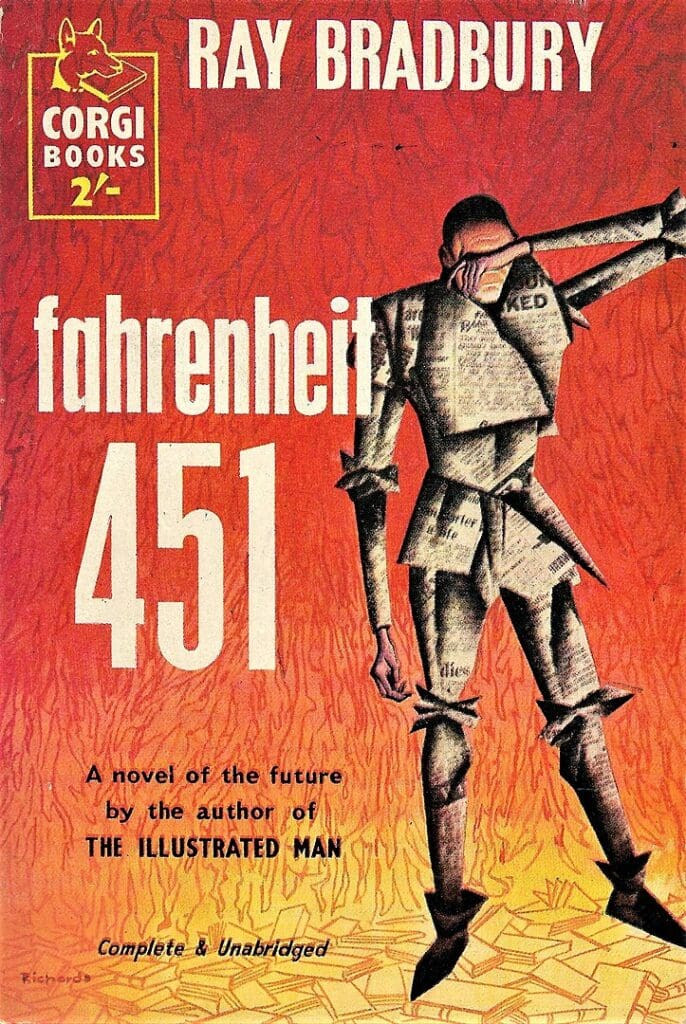
Jim Linwood, CC BY 2.0, via Wikimedia Commons
It was a pleasure to burn” immediately reveals the dystopian world of Fahrenheit 451, where burning books has become a form of entertainment. This ominous and unsettling first line establishes the novel’s themes of censorship and increased illiteracy right from the start.
It hints that values have become twisted in this society where destroying knowledge gives pleasure. The vivid contrast between the dark imagery of burning and the word “pleasure” makes the line impactful and memorable. This line sets the tone of irony and social commentary that characterizes the novel while drawing readers in by creating mystery around why book burning could be enjoyable.
It is a perfect encapsulation of Bradbury’s vision that resonates with readers and cements the line’s status as one of the most famous opening lines in fiction. It is one of the few books that will take you less time to read.
4. “Call me Ishmael.” – “Moby-Dick” by Herman Melville
This famous three-word opening immediately pulls readers into the novel by introducing the narrator and protagonist, Ishmael. His direct invitation to the audience to call him by his name creates an intimate tone and a sense of mystery around this character whose real name remains unknown.
While deceptively simple on the surface, the line establishes Ishmael as an allegorical figure and hints at biblical associations that permeate the novel. As both Ishmael and the famous white whale come to embody complex symbolic meanings, this name sets the stage for the epic struggle to follow.
The layered minimalism of “Call Me Ishmael” makes it one of the most iconic openings in American literature and an unforgettable introduction to the world of Moby-Dick.
5. “All children, except one, grow up.” – “Peter Pan” by J.M. Barrie

Herbert Rose Barraud, Public domain, via Wikimedia Commons
This first line deftly establishes the magical, timeless quality of the fictional world of Neverland while introducing a central character, Peter Pan. By stating that all children grow up except one, Barrie hints at the adventures to come and Peter’s eternal childhood.
The longing to remain young resonated deeply with readers, making the book a beloved classic. The sadness implicit in most children having to leave childhood behind adds a touch of bittersweet emotion as well. The seeming simplicity of this opening line actually contains the entire thematic world of the novel in just 10 words.
Both touching and clever, this famous first line draws readers into Peter Pan’s story in a way that has resonated for generations, cementing its status as one of the most memorable openings in children’s literature.
6. “Happy families are all alike; every unhappy family is unhappy in its own way.” – “Anna Karenina” by Leo Tolstoy
This opening line immediately pulls the reader into the themes of family and unhappiness that define the novel. It proposes a philosophical idea claiming happy families share common traits while each unhappy family’s troubles are unique.
This hints at the complexity Tolstoy will reveal behind the facades of his characters’ lives. The line also introduces a paradox, setting up an intricate exploration of domestic relationships. By offering this insight in the very first line, Tolstoy establishes his interest in depicting the intricacies of human nature and the social conditions of late 19th-century Russia.
The line’s thought-provoking nature and irony have made it one of the most oft-quoted openings in literature and set the stage beautifully for the complex story that follows.
7. “It was a bright cold day in April, and the clocks were striking thirteen.” – “1984” by George Orwell

издательстве «Прогресс», Public domain, via Wikimedia Commons
This opening line immediately immerses readers in the dystopian setting of 1984. The contradiction between “bright” and “cold” hints at underlying tensions while the clocks striking an irregular number creates a sense of unease and wrongness.
This line establishes the novel’s themes of totalitarianism and warnings against government overreach. Orwell reveals an unsettling world where time itself is unpredictable and language unreliable.
As part of perhaps the most iconic first page in dystopian fiction, this line sets the ominous, paranoid tone of the novel while hinting at the significance of language and psychology in Orwell’s harrowing vision. Its plain language belies how much is contained in the line, making it impactful and unforgettable. This is why it stands as one of the most famous and powerful opening lines in literature.
8. “In my younger and more vulnerable years, my father gave me some advice that I’ve been turning over in my mind ever since.” – “The Great Gatsby” by F. Scott Fitzgerald
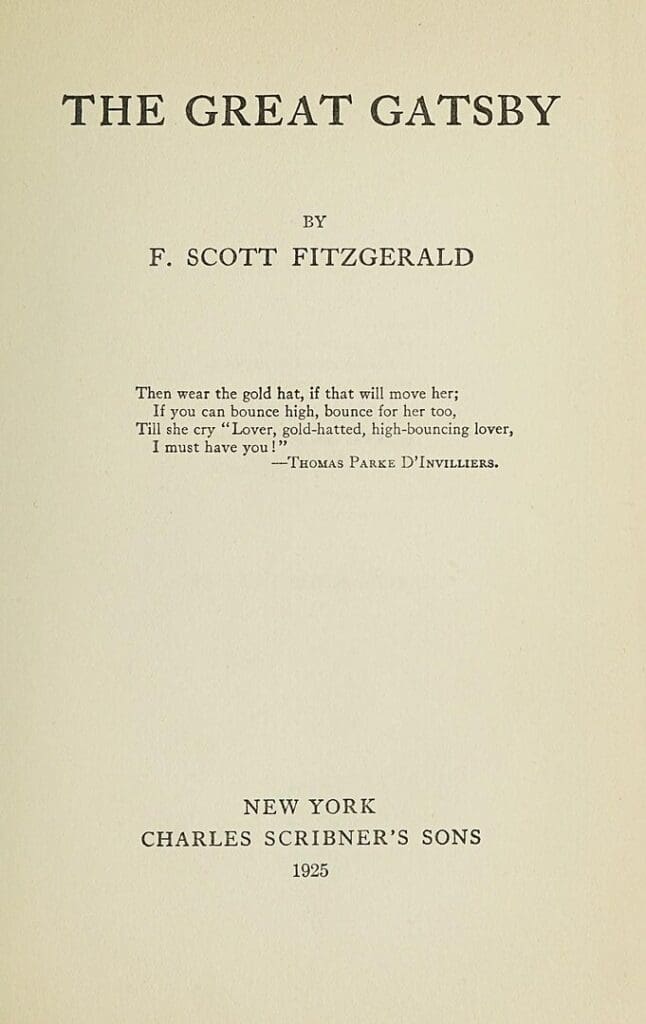
F. Scott Fitzgerald, Public domain, via Wikimedia Commons
This opening line establishes the reflective, nostalgic tone of the novel and introduces the narrator, Nick Carraway. It hints at the theme of memory’s imperfections and the idealism of youth by suggesting Carraway is looking back from a more mature perspective.
The line also foreshadows the crucial role of the advice from Carraway’s father that anchors his morally ambivalent navigation of the lavish and corrupt world of the elite. While deceptively simple, in one long sentence, Fitzgerald reveals the narrator’s youth, uncertainty, and psychological depth, while creating a sense of reflection on the past.
This line effortlessly draws readers into the world of Gatsby and Carraway’s convoluted relationships, cementing its reputation as one of the most memorable opening lines in 20th-century American fiction.
9. “I am an invisible man.” – “Invisible Man” by Ralph Ellison
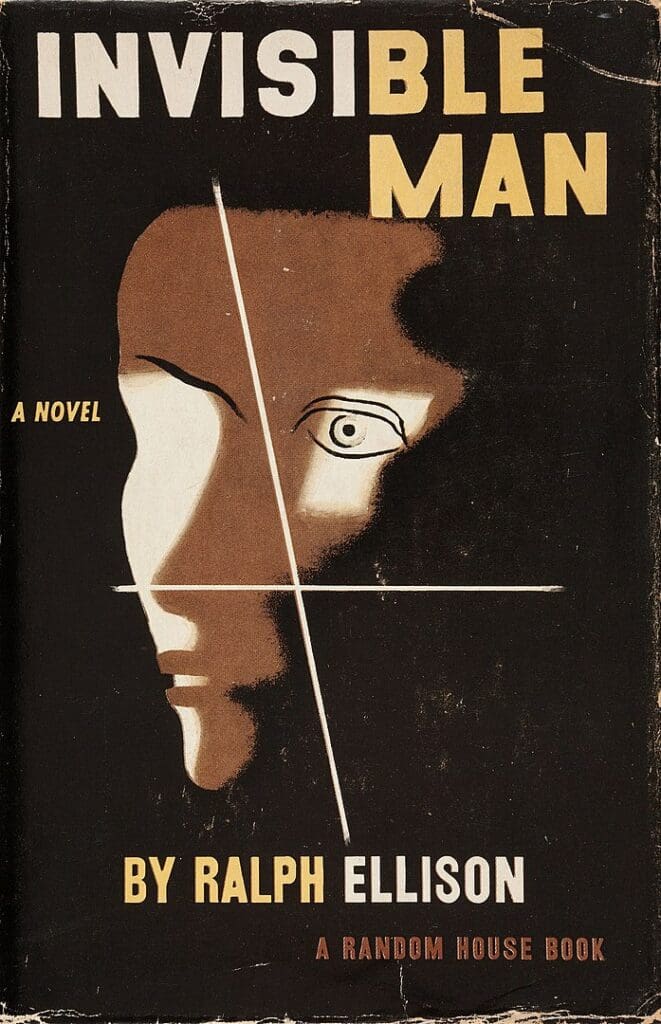
English: Dust jacket designed by E. McKnight Kauffer. Published by Random House., Public domain, via Wikimedia Commons
This paradoxical opening line immediately introduces the invisible man, the unnamed narrator and protagonist, while hinting at the novel’s themes of invisibility and exclusion. Though the narrator is physically present, his lack of identity and agency in 1950s America renders him unseen in the eyes of society.
This line powerfully evokes the psychological effects of racism and the struggle for equality. While seemingly straightforward, the complexity behind the literal and metaphorical meanings of “invisible” resonates throughout the novel.
This deceptively simple line draws readers into the unique perspective of Ellison’s narrator and the way social conditions impact individual identity. It immediately poses questions about what invisibility means in this context, setting up the novel’s layered exploration of race and social inequity.
10. “It was love at first sight.” – “Catch-22” by Joseph Heller

derivative work: Anrie (talk)Joseph_Heller1986.jpg: MDCArchives, CC BY-SA 3.0, via Wikimedia Commons
This deadpan opening line sets the satiric tone of the novel. By starting with a clichéd phrase that readers expect to introduce a romantic story, Heller immediately subverts expectations. The line actually refers to an army major who wants to censor enlisted men.
This absurd disconnect highlights the illogical bureaucracy and dehumanization of war. The New York native uses ironic understatement to make a powerful anti-war statement, juxtaposing the horror of war against the banality of the line “It was love at first sight.” This deceptively simple opening immediately establishes the novel’s dark satirical voice.
It draws readers in through irony and misdirection, setting the stage for Heller’s searing exploration of war’s moral paradoxes that have cemented Catch-22 as a timeless literary masterpiece.
11. “All this happened, more or less.” – “Slaughterhouse-Five” by Kurt Vonnegut
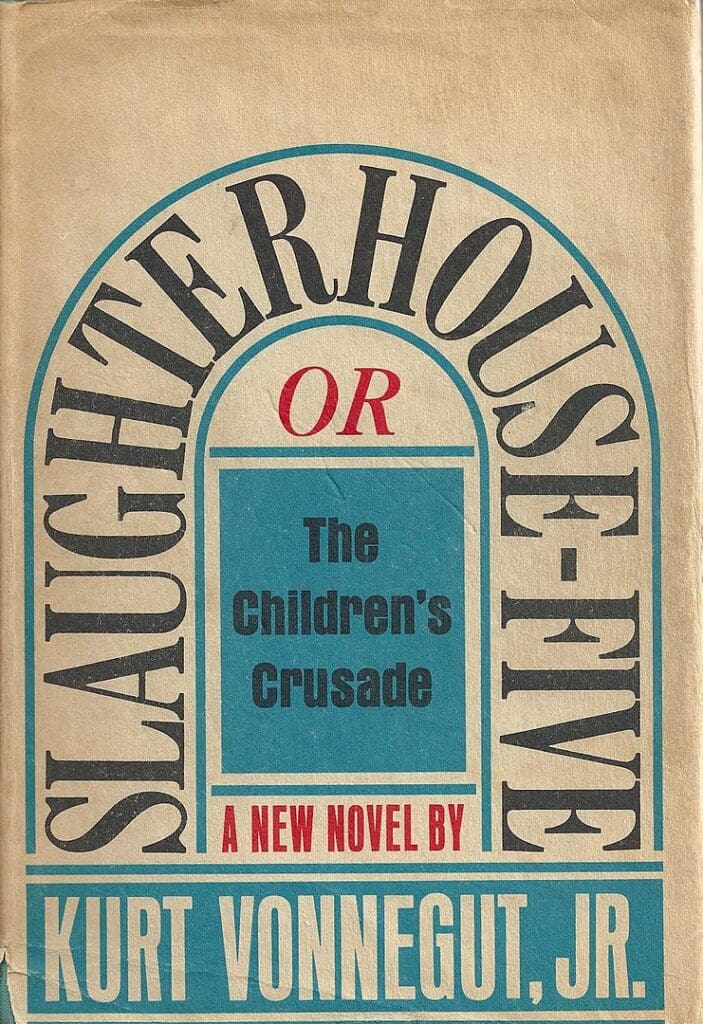
The credit “Jacket design by Paul Bacon” is found on the left jacket flap. (For jurisdictions that define copyright terms on the date of the author’s death: according to this article, Bacon died in 2015.), Public domain, via Wikimedia Commons
With this simple opening line, Vonnegut immediately points to the blurring of fact and fiction that characterizes the novel. The narrator admits the imprecise nature of his war story right from the start, compromising its authority and truthfulness.
This line sets up the novel’s nonlinear structure and establishes it as semi-autobiographical, blending history and imagination. It hints at Vonnegut’s own struggle to reconstruct the traumatic events he witnessed as a prisoner of war in Dresden. This offbeat statement exemplifies the dark humour and moral ambiguity that permeates Slaughterhouse-Five.
In just six words, Vonnegut creates complexity, introduces the novel’s metafictional qualities, and sets a unique tone, cementing this line’s reputation as one of the most impactful opening lines of an anti-war novel.
12. “In a hole in the ground there lived a hobbit.” – “The Hobbit” by J.R.R. Tolkien
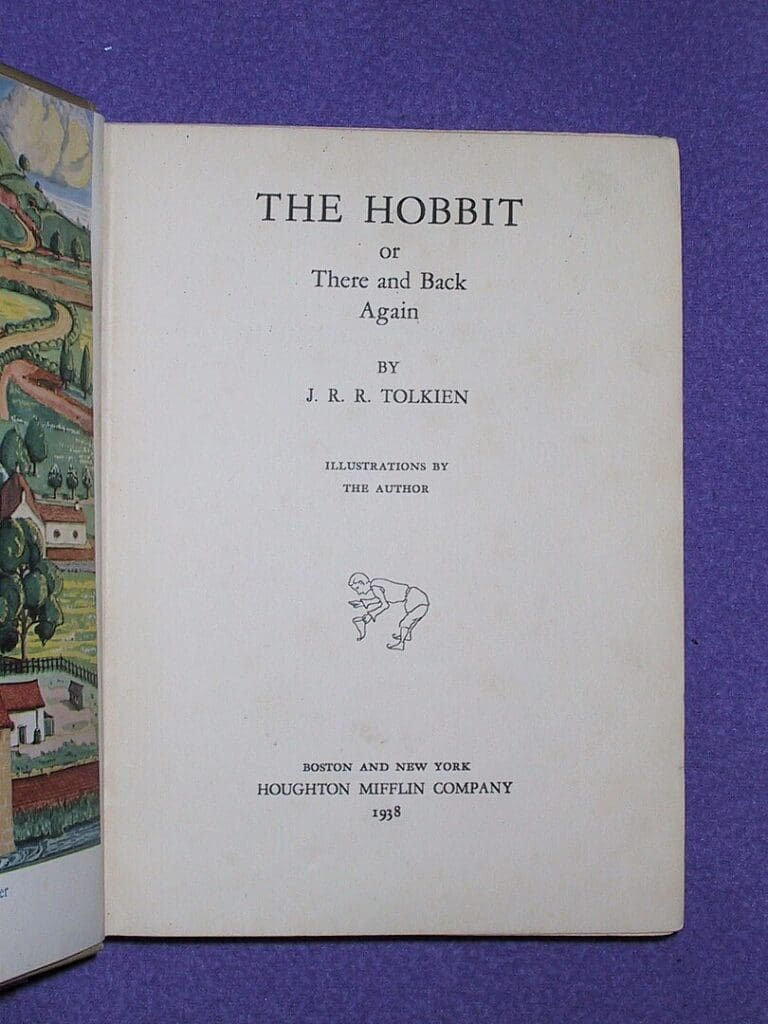
Strebe at English Wikipedia, Public domain, via Wikimedia Commons
This first line immediately transports readers into the charming world of Middle Earth while introducing the concept of hobbits and their underground homes. The plain language and matter-of-fact description of a hobbit hole draw readers in while establishing a whimsical fairy tale tone.
The line hints that something extraordinary is about to happen to this seemingly ordinary creature without revealing too much. It is an excellent example of Tolkien’s ability to create intrigue and immerse readers in the Shire right from the start.
The line sets the stage for Bilbo’s reluctant journey while also exemplifying Tolkien’s mastery of expositional yet engaging opening lines. It provides just enough detail to capture interest while leaving readers curious to learn more about hobbits, their holes, and the adventures to come.
13. “It is a truth universally acknowledged, that a single man in possession of a good fortune, must be in want of a wife.” – “Pride and Prejudice” by Jane Austen
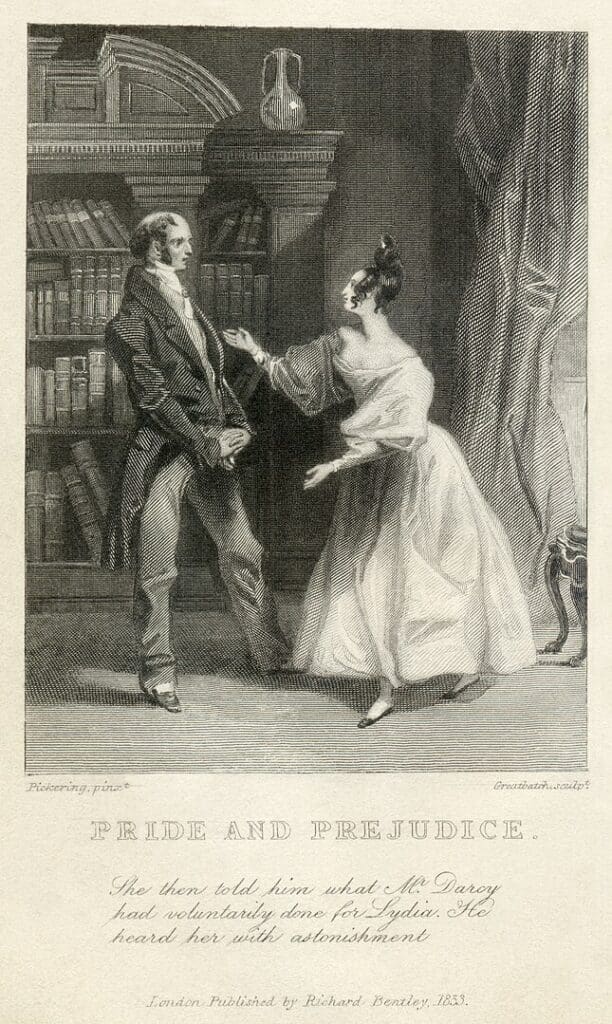
Pickering & Greatbatch, Public domain, via Wikimedia Commons
This line concisely establishes the key themes of marriage, reputation, and social standing that drive the plot of the novel. The dry, ironic tone highlights the absurdity of the claim while subtly criticizing the strict social mores of 19th-century England.
Despite its matter-of-fact delivery, the line cleverly calls into question societal beliefs about men, women, and marriage. It encapsulates the satirical wit Austen employs to highlight the social follies and romantic misunderstandings that her protagonist Elizabeth Bennet eventually transcends.
The line’s simultaneous embrace and critique of traditional values draw readers into the story while revealing Austen’s astute social commentary. For these reasons, the opening line is widely considered among the most memorable in English literature and brilliantly sets the stage for the comedy of manners that follows.
14. “A screaming comes across the sky.” – “Gravity’s Rainbow” by Thomas Pynchon
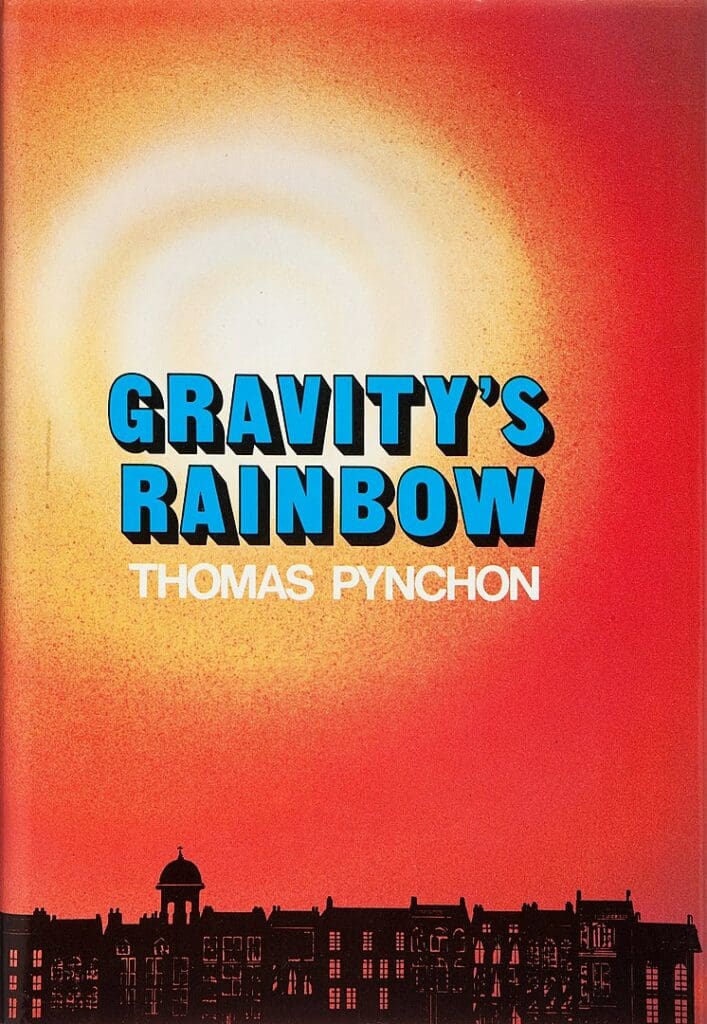
English: From inside left jacket flap: “Jacket design by Marc Getter”. For jurisdictions that do not apply the rule of the shorter term for US works and instead base copyright term on the date of the author’s death: according to PynchonWiki, Getter lived from 1947–2008., Public domain, via Wikimedia Commons
This ominous opening line immediately pulls readers into the novel’s hallucinatory world by introducing a mysterious, threatening scream from the sky. The vivid action and strange imagery create a cinematic, immersive and movie-like effect that demands attention yet leaves ambiguity.
This line foreshadows the paranoia, violence, and chaos that unfold in the novel set during WWII. It establishes Pynchon’s postmodern style with its sensory explosion and hints at the philosophical questions underpinning his layered narrative. The line plunges readers into the chaos of war and asks them to make meaning from it.
This bold, provocative start exemplifies Pynchon’s ambition in Gravity’s Rainbow and the layered complexity behind its surreal worlds. It is a prime example of an arresting opening line that captures a novel’s essence while compelling readers to search for answers within the story that follows.
15. “You better not never tell nobody but God.” – “The Color Purple” by Alice Walker
This statement establishes the protagonist Celie’s epistolary, confessional style and voice right away. Her vernacular speech reveals her lack of education and worldliness, but her story’s obscurity suggests pain. Celie’s urgent plea creates an intimate tone that hooks readers in even as it implies oppressive powers keep her silent.
Walker depicts Celie’s loneliness, sensitivity, and resilience in this deceptively basic Southern dialect. The passage effectively sets up Celie’s path from slavery to independence, which is fundamental to Walker‘s examination of racism, misogyny, brutality, and, finally, empowerment.
This opening phrase plunges readers deep into Celie’s world, providing a prism through which we may explore the harsh reality of 1930s Georgia as Celie discovers her identity.
16. “124 was spiteful.” – “Beloved” by Toni Morrison
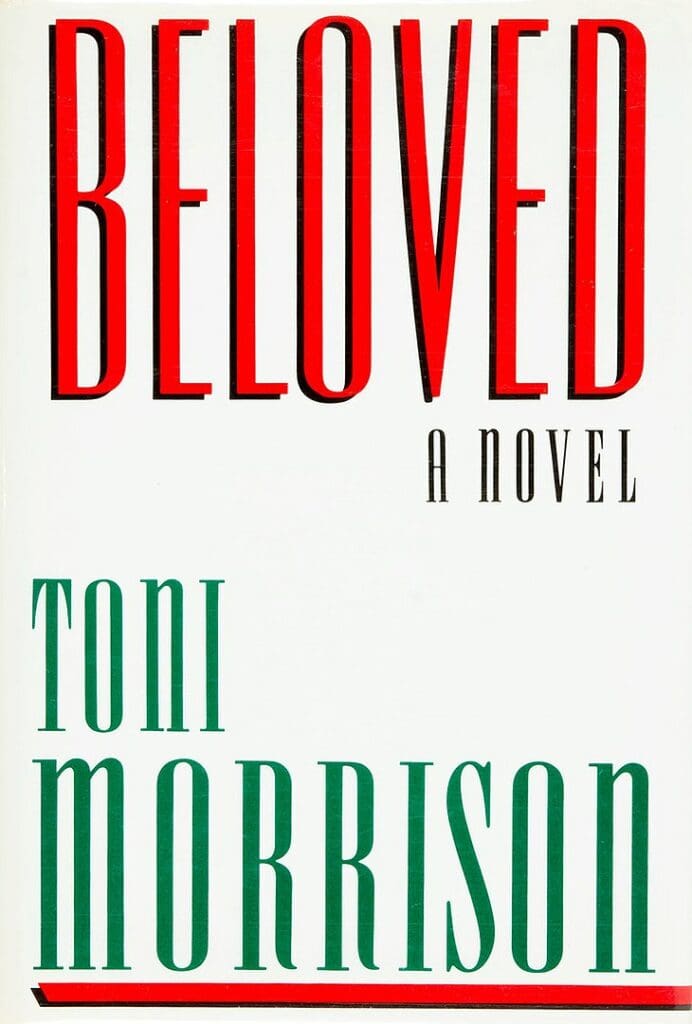
English: Jacket design by R. D. Scudellari. Published by Alfred A. Knopf., Public domain, via Wikimedia Commons
With this bold and puzzling opening line, Morrison immediately draws readers into the world of Beloved. The unconventional attribution of human emotion to house number 124 establishes an ominous, haunted tone and sense of foreboding. It hints at the complex, traumatic history enclosed within the house’s walls.
The line introduces the sentient, menacing quality of the house itself, which takes on great symbolic significance. In just three striking words, Morrison begins to unfold the mysteries of 124, its inhabitants, and the spiteful spirit within. The line’s haunting imagery and anthropomorphic language immediately signal Morrison’s lyrical style and the psychological intensity she brings to depicting slavery’s legacy.
This line powerfully sets the stage for Morrison’s unflinching examination of memory, identity, and the reverberations of this dark chapter of American history.
17. “To Sherlock Holmes, she is always the woman.” – “A Scandal in Bohemia” by Arthur Conan Doyle
This line immediately introduces the iconic character of Sherlock Holmes and his fascinating relationship with the mysterious Irene Adler. By referring to Adler simply as “the woman”, Conan Doyle hints at her singular importance in Holmes’ mind and the unusual depth of feeling she inspires in the normally detached detective.
The line also establishes the story’s central mystery and Holmes’ preoccupation with Adler, who has outwitted him before. Though brief, it reveals key character dynamics and foreshadows Holmes meeting his match in Adler. It deftly encapsulates the wit, intrigue, and subtle romance that characterize Conan Doyle’s popular Sherlock Holmes adventures.
This concise yet evocative opening line draws readers into the world of 221B Baker Street while providing a perfect entry point to the series’ Victorian elegance, dry humour, and detective drama.
18. “I write this sitting in the kitchen sink.” – “I Capture the Castle” by Dodie Smith
This playful opening immediately establishes the lively, unconventional narrative voice of the protagonist Cassandra and her determination to find any place to write despite lacking a room of her own.
The line’s humour and charm reveal Cassandra’s creativity and quirky worldview while drawing readers into her circumstances of living in poverty in an old English castle. The kitchen sink setting hints that a traditional girl’s coming-of-age story is about to be upended.
In one succinct line of direct address, Smith introduces her self-aware heroine and the journal conceit that structures the novel. This witty opening line sets the tone for Cassandra’s insightful, at times naïve, chronicle of her artistic ambitions and her observant, philosophical musings on life, love, and growing up in an eccentric family.
19. “The unicorn lived in a lilac wood, and she lived all alone.”- “The Last Unicorn” by Peter S. Beagle

Jonathunder, GFDL 1.2, via Wikimedia Commons
This line economically establishes the fairy tale setting and mood with details like “a lilac wood” and introduces the unicorn who is central to the story. The revelation that she lives alone hints at the isolation and separation from her kind that will drive her quest.
Beagle creates intrigue around why this unicorn is alone and what makes her “the last.” The language has a gentle, folkloric tone that draws readers into the world of myth and magic. Yet a note of sadness in the beautiful unicorn’s solitude adds poignancy.
The power of this compact line exemplifies Beagle’s skill at storytelling. Both timeless and melancholic, it ushers readers into a fantasy realm while setting up key themes of the novel – yearning, loss, and being truly unique.
20. “It was the day my grandmother exploded.” – “The Crow Road” by Iain Banks
This humorously shocking opening line immediately grabs the reader’s attention. By stating something bizarre and impossible right away, Banks establishes a quirky narrative voice and tone of magical realism thanks to his prowess in writing on sci-fi.
This line intrigues through overstated mystery, piquing the reader’s curiosity about the grandmother’s figurative or literal explosion as well as the narrator’s unique mindset. The playful matter-of-fact quality grounds the surreal event in reality. This line exemplifies Banks’ ability to fuse the fantastical with the mundane.
It draws the reader into the Scottish countryside setting while hinting at dark family secrets and mysteries to come. The line’s whimsical yet haunting impact sets the stage for a poignant exploration of memory, death, and the strange, funny, and sad aspects of life.
21. “The past is never dead. It’s not even past.” – “Requiem for a Nun” by William Faulkner
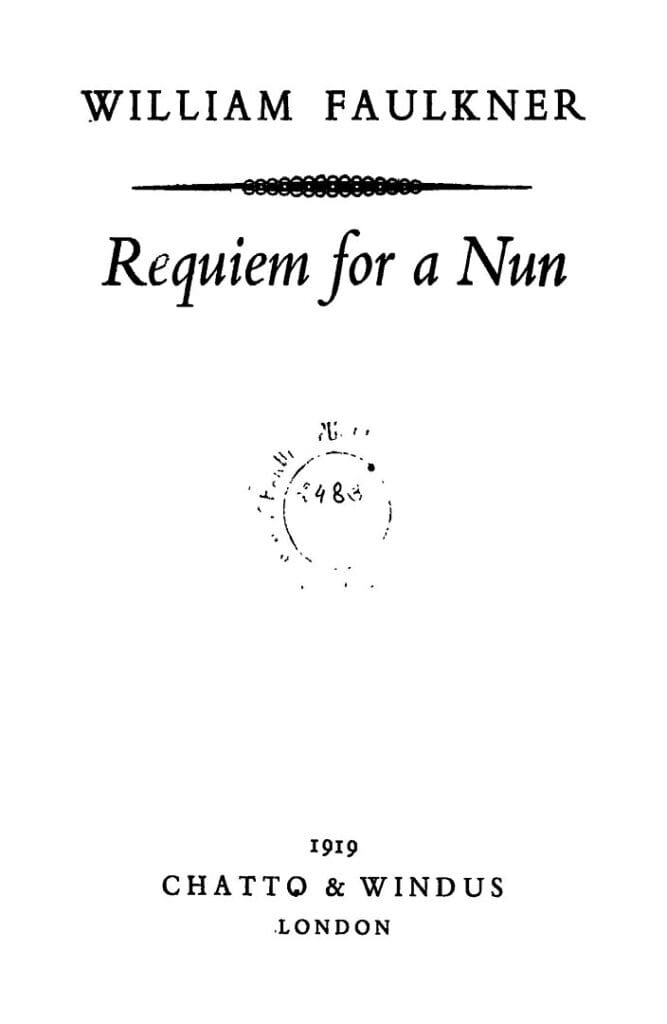
Hamzadudgeon, CC BY-SA 4.0, via Wikimedia Commons
This poetic line condenses the key themes of history, morality, and guilt that shape the novel. Faulkner suggests the inescapability of the past and its lingering trauma, haunting people generation after generation.
There is a cyclical nature to time as patterns replay themselves throughout history, binding us to past deeds. This philosophical statement implies humanity’s moral duty to atone for sins of the past and learn from mistakes.
Though complex, this opening line immediately draws readers into considering the moral weight and indelible stain of history. It establishes the reflective tone and social commentary that characterize Faulkner’s storytelling.
This profound message encapsulates the novel’s preoccupation with the legacy of slavery and racism, posing philosophical questions that still resonate deeply today.
22. “Mother died today.” – “The Stranger” by Albert Camus
With this blunt, jarring opening line, Camus immediately establishes the detached, largely emotionless voice of protagonist Meursault. The plain delivery of his mother’s death hints at Meursault’s indifference and the absurd disconnect between expected sentiment and his apathy.
The line introduces themes of existential alienation and society’s expectations versus individual meaning that shape the novel. Though simple, it conveys dissociation and confusion over traditional morality, setting the tone for the philosophical questions Camus raises about life’s meaning, intention, and consequence.
This matter-of-fact line plunges readers into Meursault’s absurdist worldview and existential struggles, drawing us into the paradoxes Camus explores about human nature, justice, and living honestly in an irrational world.
23. “Here is a small fact: You are going to die.” – “The Book Thief” by Markus Zusak
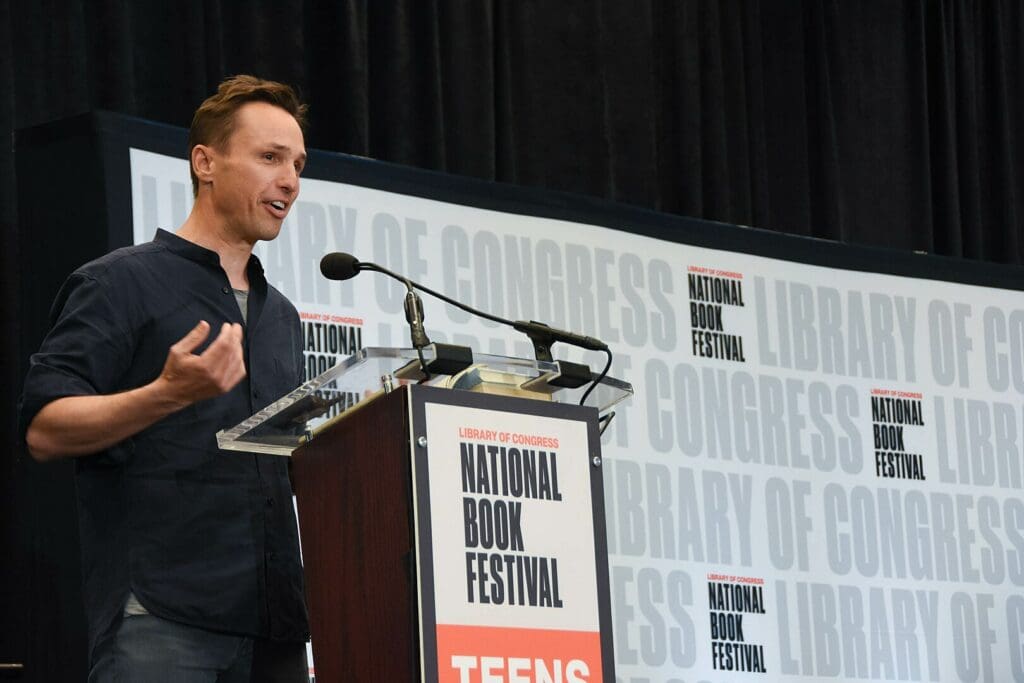
Library of Congress Life, CC0, via Wikimedia Commons
Markus Zusak’s “The Book Thief” begins with this startling truth, immediately confronting readers with mortality, setting an introspective and poignant tone for the novel set in Nazi Germany.
The line serves as a sobering reminder of life’s impermanence, urging readers to contemplate existence and the human experience amid a tumultuous historical backdrop. Its directness captures attention, foreshadowing themes of loss, resilience, and the power of words within the narrative.
The line’s haunting simplicity resonates deeply, invoking a sense of urgency to cherish life’s moments and instilling a lasting impact, making it an unforgettable start to an emotionally evocative story.
24. “Your house glows at night like everything inside is on fire.” – “The Push” by Ashley Audrain
Ashley Audrain’s “The Push” opens with this hauntingly vivid image, immediately setting an eerie atmosphere that captivates readers. The stark metaphor hints at hidden turmoil within the seemingly idyllic facade, foreshadowing the novel’s exploration of motherhood, trauma, and familial complexities.
Its evocative quality draws readers into a psychological thriller, provoking curiosity about the character’s inner lives and the secrets concealed behind closed doors.
The line’s stark visual imagery and underlying tension establish an atmosphere of unease, making it a striking and memorable beginning to a gripping narrative. The Canadian native truly did justice when writing this book.
25. “You are a fingerprint. When you open your eyes on the last day of your life, you see your own thumb.”- “Notes on an Execution” by Danya Kukafka
This line is considered to be among the most famous first lines of books because it is both poetic and profound. It immediately transports the reader into the mind of the protagonist, a serial killer on death row, and forces us to confront the inevitability of death. The line also suggests that our individuality is defined by our unique experiences and perspectives, which are as unique as our fingerprints.
The line is also notable for its ambiguity. It is not clear whether the protagonist is literally seeing his own thumb when he opens his eyes on the last day of his life, or whether this is a metaphor for the moment of death, when we are finally able to see ourselves clearly and without illusions.
26. “This is my favourite book in all the world, though I have never read it.”- “The Princess Bride” by William Goldman

Gotfryd, Bernard, photographer, Public domain, via Wikimedia Commons
William Goldman’s “The Princess Bride” starts with this intriguing line, immediately captivating readers with its paradoxical nature and sparking curiosity about the story behind such a declaration.
It sets the whimsical and humorous tone for the novel, preparing readers for a tale that blurs the lines between reality and fiction. This line stands out as one of the famous first lines in literature due to its cleverness, humour, and the promise of an unconventional narrative filled with adventure, romance, and a playful approach to storytelling, drawing readers into a world of imagination and wit.
27. “Life changes fast. Life changes in the instant. You sit down to dinner and life as you know it ends. The question of self-pity.” – “The Year of Magical Thinking” by Joan Didion

Joan Didion, Public domain, via Wikimedia Commons
This line is considered to be among the most famous first lines of books because it is both powerful and poignant. It immediately plunges the reader into the raw vulnerability of loss and the suddenness of life-altering moments.
It’s famous for its emotional resonance and stark truth about the unpredictability of existence. The Sacramento native introspective reflection on grief, self-pity, and the fragility of life captivates audiences, setting the tone for a deeply personal narrative exploring the complexities of mourning and the human experience amidst tragedy.
This line’s emotional impact and universal relevance make it an unforgettable start to an emotionally stirring memoir.
28. “The man in black fled across the desert, and the gunslinger followed.” – “The Gunslinger” by Stephen King
Stephen King‘s “The Gunslinger” commences with an iconic line: “The man in black fled across the desert, and the gunslinger followed.” This opening captivates with its immediate sense of pursuit and mystery, setting the stage for an epic, otherworldly quest.
It introduces the enigmatic gunslinger and the elusive man in black, establishing an instant atmosphere of tension and curiosity. This line’s brevity and evocative nature paint a vivid scene, drawing readers into a vast and unknown landscape.
Its compelling narrative hook, pitting relentless determination against elusive escape, marks it among the famous first lines in literature, enticing readers into a darkly fantastical world ripe with adventure, suspense, and the unknown.
29. “No live organism can continue for long to exist sanely under conditions of absolute reality walked alone.”- “The Haunting of Hill House” by Shirley Jackson
Shirley Jackson’s “The Haunting of Hill House” opens with the chilling line: “No live organism can continue for long to exist sanely under conditions of absolute reality walked alone.” This haunting declaration immediately establishes an eerie atmosphere, hinting at psychological disturbances within the narrative.
It captivates readers with its ominous tone, foreshadowing the unnerving events to unfold in Hill House. The line’s evocative language and unsettling premise resonate deeply, drawing audiences into a world where reality bends and twists, questioning the sanity of those within it.
Its enigmatic nature and foreboding implications contribute to its recognition as one of literature’s famous opening lines, setting the stage for a suspenseful exploration of the supernatural and the human psyche. The California native mastery of literature gave fruit to one of the most memorable first lines in history.
30. “I still remember the day my father took me to the Cemetery of Forgotten Books for the first time.” – “The Shadow of the Wind” by Carlos Ruiz Zafón

Mutari, Public domain, via Wikimedia Commons
Carlos Ruiz Zafón’s “The Shadow of the Wind” opens with this captivating line, immediately intriguing readers with its mysterious and enchanting premise. The line introduces the concept of a hidden library of neglected books, setting the tone for a tale filled with secrets, nostalgia, and the power of literature.
The line’s lyrical beauty and the promise of a magical literary journey resonate deeply with book lovers, drawing them into a world where forgotten stories await discovery. Its captivating allure and sense of wonder contribute to its status as one of literature’s famous and unforgettable opening lines. Carlos is one of the most influential Spanish authors of all time.
31. “How should a person be? For years I asked it of everyone I met.” – “How Should a Person Be?” by Sheila Heti
Sheila Heti’s “How Should a Person Be?” starts with this provocative line, immediately engaging readers with its universal quest for identity and purpose. It lays bare the vulnerability and uncertainty of self-discovery, resonating profoundly with those navigating life’s complexities.
It’s raw honesty and existential inquiry capture the essence of human introspection, inviting readers into an intimate journey of self-exploration. This line’s relatability and profound inquiry into the human condition make it stand out, marking the beginning of a narrative that delves deep into the complexities of personal identity and the search for meaning, earning its place among notable first lines in literature. Sheila is among the most famous Canadian people.
32. “We slept in what had once been the gymnasium.” – “The Handmaid’s Tale” by Margaret Atwood
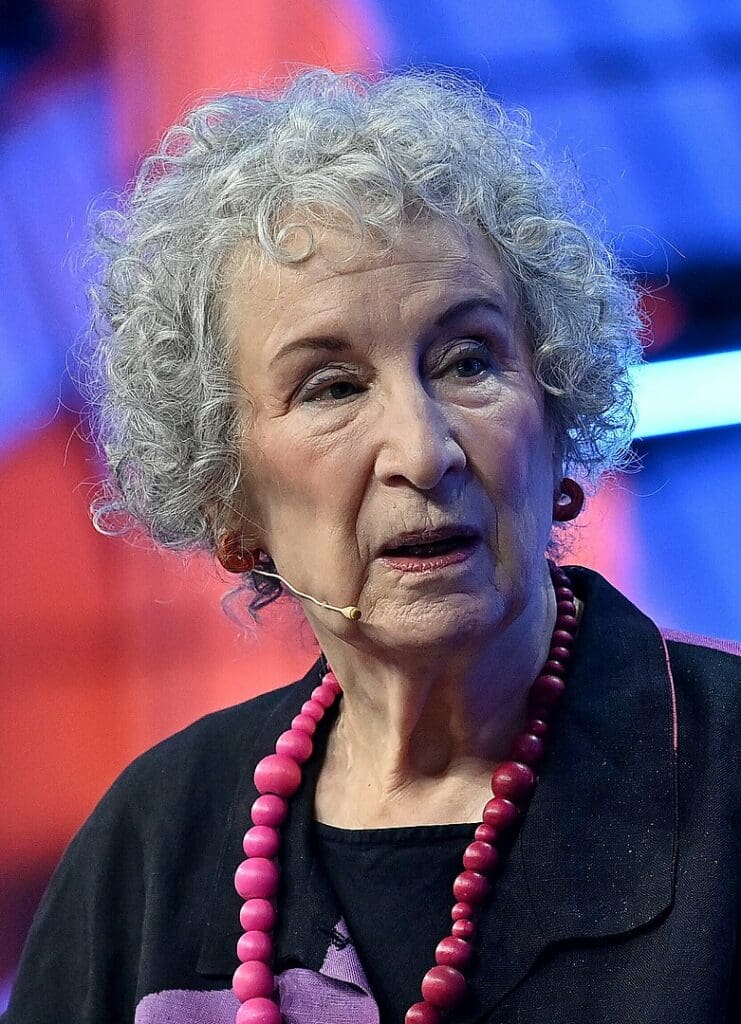
Collision Conf, CC BY 2.0, via Wikimedia Commons
Margaret Atwood’s “The Handmaid’s Tale” begins with this stark revelation, instantly plunging readers into a dystopian world and evoking curiosity about the radical societal changes that transformed a familiar space into a dormitory.
It sets an eerie tone, hinting at the loss of normalcy and the restructuring of society. The line’s chilling simplicity encapsulates the story’s atmosphere of oppression and upheaval.
The line’s immediate portrayal of a transformed setting and the implications of the past echo throughout the narrative, leaving a lasting impact. This line’s powerful imagery and foreboding nature establish it as one of literature’s famous opening lines, introducing readers to a disturbingly altered reality. Her work puts her among the most famous authors of the 21st century.
33. “In the town, they tell the story of the great pearl—how it was found and how it was lost again.” – “The Pearl” by John Steinbeck
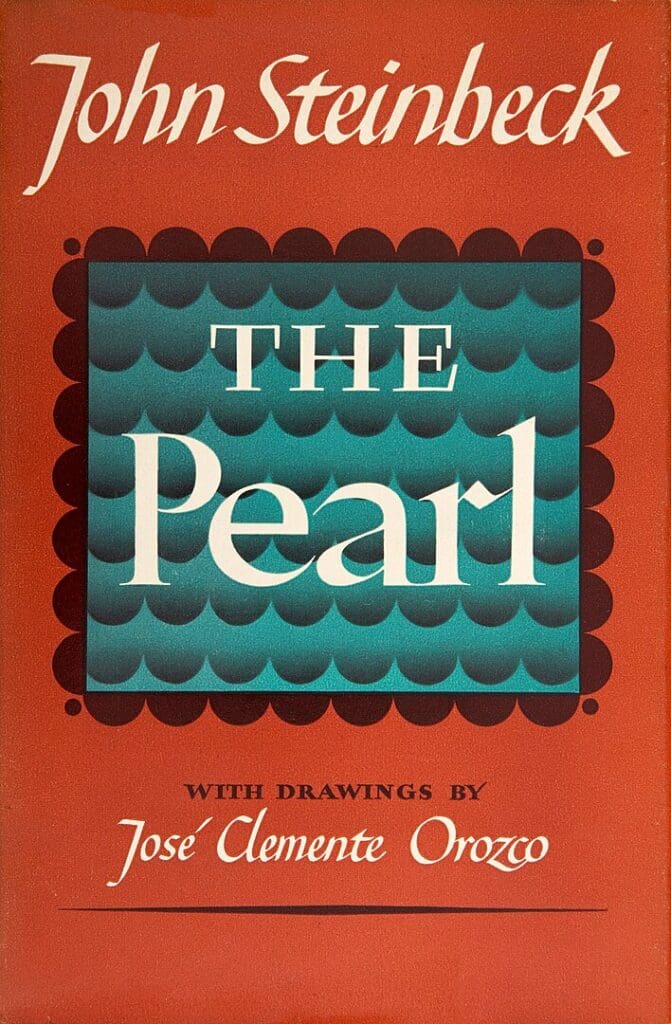
English: Dust jacket designed by Robert Hallock. Published by Viking Press., Public domain, via Wikimedia Commons
John Steinbeck’s “The Pearl” opens with this compelling line, immediately sparking intrigue and setting the stage for a tale woven with the allure of great discovery and the inevitability of loss. It encapsulates the novel’s essence, foreshadowing themes of desire, greed, and the consequences of sudden fortune.
The line’s narrative simplicity, coupled with its promise of an enthralling story, draws readers into a world where the pursuit of wealth intertwines with the complexities of human nature. This line’s captivating power and timeless relevance secure its place among the memorable and famous opening lines.
34. “Someone must have slandered Josef K., for one morning, without having done anything truly wrong, he was arrested.” – “The Trial” by Franz Kafka
Franz Kafka’s “The Trial” begins with this enigmatic line, immediately thrusting readers into the disorienting world of the protagonist, Josef K., navigating an inexplicable and oppressive bureaucratic system. It encapsulates the novel’s themes of absurdity, alienation, and the individual’s powerlessness against an inscrutable and unjust authority.
The line’s unsettling ambiguity and the abruptness of Josef K.’s arrest captivate audiences, evoking a sense of unease and curiosity about the mysterious circumstances surrounding his predicament.
Its chilling portrayal of injustice and the arbitrary nature of power solidify its place as a famous and thought-provoking opening line for a book.
35. “This is the saddest story I have ever heard.” – “The Good Soldier” by Ford Madox Ford

Ford Madox Ford(Life time: 1873-1939), Public domain, via Wikimedia Commons
Ford Madox Ford’s “The Good Soldier” begins with this poignant statement, immediately establishing an emotional tone and hinting at the sorrow and tragedy that will unfold within the narrative.
It captivates readers with its melancholic proclamation, setting the stage for a tale of heartbreak, betrayal, and the complexities of human relationships.
The line’s profound declaration of sorrow and the suggestion of an intricate and sorrowful narrative ahead entices readers, evoking their curiosity about the characters and the events that lead to such profound sadness. Its emotive impact and promise of a deeply affecting story secure its place among literature’s famous and evocative opening lines. Ford is one of the most remarkable authors that we ought to know about thanks to his contribution to the literature world.
36. “Through the fence, between the curling flower spaces, I could see them hitting.” – “The Sound and the Fury” by William Faulkner
William Faulkner’s “The Sound and the Fury” opens with this vivid image, immediately immersing readers in a scene pulsating with tension and curiosity. It introduces the complex and fragmented narrative perspectives of the novel, hinting at the tumultuous relationships and hidden emotions within the Compson family.
The line’s sensory details and cryptic nature lure readers into a web of intrigue, inviting them to decipher the intricacies of the characters’ lives. Its lyrical prose and atmospheric description capture the essence of Faulkner’s narrative style, setting the stage for a multi-layered exploration of memory, time, and the human condition. Straight from Mississippi, William went on to craft this indescribable line that lives on to date.
37. “Every summer Lin Kong returned to Goose Village to divorce his wife, Shuyu.” – “Waiting” by Ha Jin

Voice of America, Public domain, via Wikimedia Commons
“Waiting” by Ha Jin from China begins with a startling revelation: “Every summer Lin Kong returned to Goose Village to divorce his wife, Shuyu.” This first statement summarizes the novel’s fundamental conflict, emphasizing the recurring struggle and the protagonist’s cautious desire for freedom from an unhappy marriage.
The simplicity and directness of the statement quickly set the tone for a contemplative story on duty, tradition, and the difficulties of relationships in a changing world.
It presents the conflict between personal wishes and societal expectations, enthralling readers with its emotional depth and the promise of delving into the complexities of love, commitment, and the passage of time, cementing its place as a memorable and dramatic opening line in literature.
38. “Where now? Who now? When now?” – “The Unnamable” by Samuel Beckett
Samuel Beckett’s “The Unnamable” begins with this enigmatic line, immediately plunging readers into a disorienting and existential abyss, echoing the novel’s themes of identity, existence, and the nature of consciousness.
The line’s fragmented and repetitive structure encapsulates the protagonist’s fragmented sense of self and relentless questioning. Its profound inquiry into the fundamentals of being resonates deeply, inviting contemplation about the uncertainties of existence.
This line’s philosophical depth and its encapsulation of existential angst mark it among the famous opening lines, serving as an evocative introduction to a narrative that challenges traditional storytelling, delving into the complexities of human consciousness and the search for meaning. The Irish author conjures an image by the first line which draws us to continue reading the book.
39. “In a sense, I am Jacob Horner.” – “The End of the Road” by John Barth
John Barth’s “The End of the Road” begins with this intriguing line, immediately introducing a layered narrative and hinting at the blurred boundaries of identity and reality. The use of “in a sense” challenges the certainty of the protagonist’s identity, setting the tone for a story exploring existential uncertainty and the fluidity of selfhood.
The line’s ambiguity captivates readers, prompting them to question the nature of the narrator’s connection to Jacob Horner and the implications of this association. Its enigmatic quality and the promise of a narrative journey into the complexities of identity and existential philosophy establish it as a striking and memorable opening line. The Maryland native is best known for his postmodern and metafictional fiction.
40. “The sun shone, having no alternative, on the nothing new.” – “Murphy” by Samuel Beckett
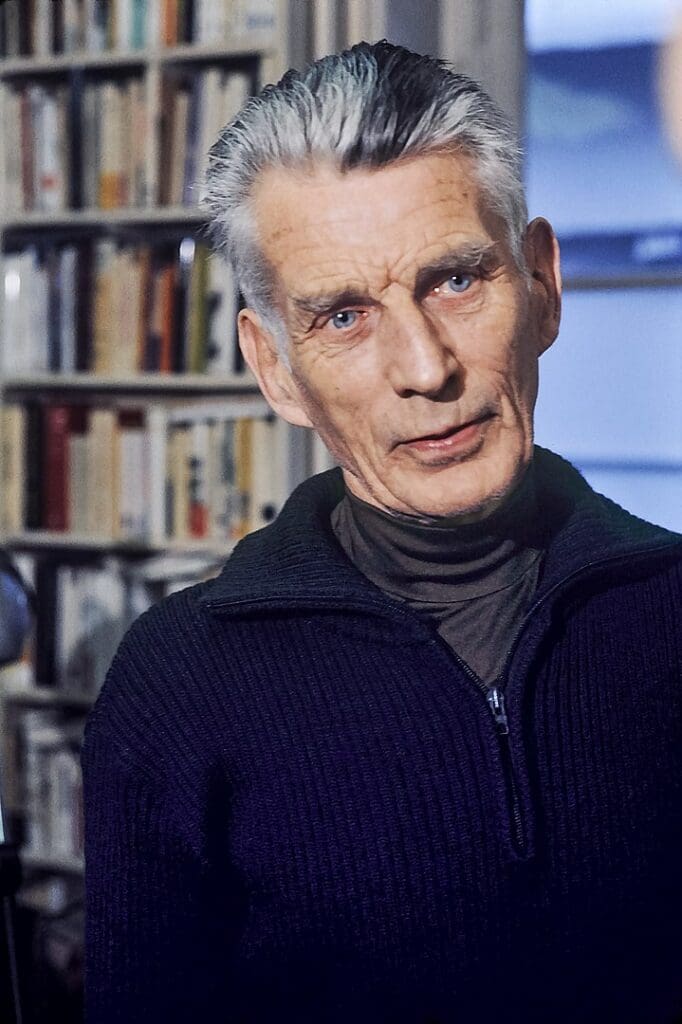
Roger Pic, Public domain, via Wikimedia Commons
Samuel Beckett’s “Murphy” opens with this enigmatic line, immediately immersing readers in a world tinged with existential disillusionment and monotony. The cryptic introduction encapsulates themes of existential despair and the repetitiveness of life’s mundane routines. Its paradoxical nature, where the unyielding sun illuminates a landscape devoid of novelty, establishes a tone of bleakness and introspection.
This line’s stark portrayal of existential ennui and its philosophical depth resonate deeply, drawing readers into Beckett’s exploration of the human condition. Its unique blend of poetic language and existential musings cements its place as a renowned and thought-provoking first piece of literature. Becket is also one of the most famous Irish poets ever.
As we come to the end of our trip via these legendary opening lines, we are reminded of literature’s ability to quickly transport us with only words on a page. Despite their differences in tone and genre, each opening line ultimately represents our universal humanity.
They create a mosaic of the fears, hopes, difficulties, and victories that great storytellers bring to life. We merely need to open a book to relearn these old lines, and we’re back in the hands of masters, raptly turning pages.
Planning a trip to Paris ? Get ready !
These are Amazon’s best-selling travel products that you may need for coming to Paris.
Bookstore
- The best travel book : Rick Steves – Paris 2023 – Learn more here
- Fodor’s Paris 2024 – Learn more here
Travel Gear
- Venture Pal Lightweight Backpack – Learn more here
- Samsonite Winfield 2 28″ Luggage – Learn more here
- Swig Savvy’s Stainless Steel Insulated Water Bottle – Learn more here
Check Amazon’s best-seller list for the most popular travel accessories. We sometimes read this list just to find out what new travel products people are buying.










